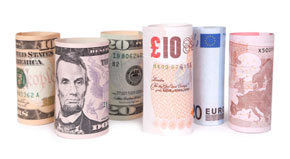In the first part of this “Much Ado About FX” series, we got to know what an exchange rate is, how it is derived, and some of the participants in the FX market. Now to the operational nitty gritty of how the FX markets in Nigeria work.
Anyone looking to buy or sell xZollers in Nigeria has three options to choose from:
- The official market, aka Bureaux de Change (BDCs)
- The parallel market, aka “Mallams”
- The private market, aka “Paddy”
The Official Market
Also called the Interbank Foreign Exchange Market (IFEM). Due to the scale of its export-related activities, the FGN, through the CBN, is supposed to have the largest store of xZollers in the country (see Part I for background). This makes the CBN the biggest seller of xZollers in the market. The CBN, however, does not sell xZollers directly to end users (they used to, but they stopped in February 2015); they provide xZollers wholesale to BDCs, who in turn sell to the end users, making their profit by selling at a slightly higher rate than they received from the CBN.
A Bureau de Change (BDC) is essentially any business where people can exchange one currency for another. BDCs are usually located at banks, travel agencies, and airports (source: Wikipedia).
The BDCs are heavily regulated by the CBN, which determines (among other things):
- the amount of xZollers they can receive on any specific day
- the applicable exchange rate(s) they can buy or sell xZollers
- who they can buy xZollers from or sell xZollers to
- the amount of xZollers they can maintain in their respective accounts
So, anyone who meets the CBN’s conditions can buy or sell xZollers in this official market.
The Parallel Market
Whenever there is a restriction to the access of a critical resource, a black market usually develops. According to Investopedia, a black market is
Economic activity that takes place outside government-sanctioned channels. Black market transactions usually occur “under the table” to let participants avoid government price controls or taxes … In the financial context, the biggest black market exists for currencies in nations with strict currency controls.
Due to the strict controls placed by the CBN in the official market, a publicly accepted black market, commonly referred to as the Parallel Market, exists. The traders in this market are popularly called “Mallams,” which is a term used to refer to men from the northern part of Nigeria; historically most of them are from this region.
In addition to the absence of CBN controls in this market, some of the reasons the Parallel Market is patronised are:
- there are more friendly hours; xZollers can be bought or sold at 10pm on a Wednesday or 7am on a Sunday
- it aids anonymity; no form of identification is required, government-issued or otherwise
- it is fast; a transaction can be completed in as little as 60 seconds with both parties happily on their separate ways afterwards
Historically there have been times when the “parallel rate” (the exchange rate in the Parallel Market) has been <5% higher than the “official rate” (the exchange rate in the Official Market). At times like this when the CBN restrictions are very tight, the parallel rate could be up to 150% higher than the official rate.
The Private Market
Simbi wants to go to Phuket, Thailand for a much-needed time away. She needs to buy some xZollers to take along for her room & board and other incidentals. Her cousin, Jide, recently received some xZollers as a birthday gift from his mum. Jide needs to exchange these xZollers for Nigerian Naira so he can go to the computer store and buy the laptop he has been wishing for. Simbi mentions to Jide her travel plans and her need for xZollers while on a visit. Jide very excitedly informs her that he has some xZollers he needs to exchange. Simbi cannot believe her luck, and they immediately agree on an exchange rate; Jide gives Simbi the xZollers, and Simbi transfers the agreed-upon amount of Nigerian Naira to Jide’s bank account.
This is the Private Market. The buyer and the seller know each other, privately agree on a rate, and transact their FX trade outside of the other two markets. The buyer is the seller’s “paddy” and vice versa. The volume of transactions that can take place here is negligible relative to the other two.
Hope this helps with your understanding of the mechanics of the Nigerian FX market. Next week, in Part III, we shall go into the “whys”:
- why is the CBN taking the actions it is taking?
- why are the banks taking the actions they are taking?
- why is the parallel rate so far away from the official rate?
- why is it so hard for me to obtain foreign currency?
Part I provides a refresher on what an exchange rate is and how it is derived. Do note that xZoller is being used here to represent primarily the U.S. Dollar, but it could also be any other internationally traded currency, like the British Pound or the Japanese Yen.
Still got questions about what you have read so far? You can drop some lines in the comments box below or send an email to comments@finomics101.com.
Merry Christmas in advance! As we celebrate the season, do remember that there will still be life next month and next year, so do not spend it all in December :).

image courtesy express.co.uk

